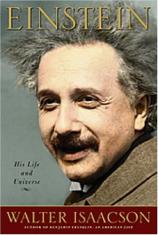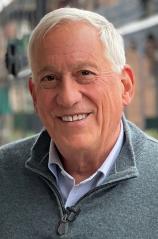Einstein: His Life and Universe
Review
Einstein: His Life and Universe
If
you can explain Einstein's theory of relativity clearly in a
paragraph or two, then you probably don't need to read this book.
But for the other 99.99 percent of the human race, it will
doubtless prove vastly enlightening.
Walter Isaacson, a seasoned writer editor and media executive,
tells the story of Einstein's life in colorful detail and makes a
valiant effort to explain his work in theoretical physics along the
way.
The life is engagingly told. It brings the man Einstein to vivid
life. The explanation of his scientific and cosmological theories
is necessarily denser and far less easy for the lay reader to
fathom. (Full disclosure: Your reviewer had a tough time indeed
with high school algebra and trigonometry, passing both largely due
to the kindness of teachers.)
Albert Einstein was born in Ulm, Germany in 1879 and died
world-famous in New Jersey in 1955. He fled Germany ahead of the
Nazi takeover and lived the last third of his life in the United
States. For all his fame, he was a kindly and self-deprecating man,
the very model of the absent-minded professor who forgot his way
home from work while lost in thought about the mysteries of the
cosmos. Isaacson's research also shows that Einstein, whose
personal life had troubles aplenty, remained a witty fellow, always
ready with a quip or a clever turn of phrase as the occasion
demanded.
His personal troubles began with his fathering a child out of
wedlock as a young man; they continued through divorce, threats and
persecution by the nascent Nazi movement, squabbles with fellow
scientists, accusations of Communist leanings from American
ultra-rightists and the FBI, unhappy relations with his two sons
and general public incomprehension of what his theories meant and
why they were important. Yet, through it all, he remained basically
optimistic, viewing the world with a kind of amused sardonic
detachment, calmly scribbling away at his equations and tilting at
enough windmills to keep a squadron of Don Quixotes busy. He
started out as a strict pacifist, only abandoning that stance when
he saw the menace of Naziism up close. He became a passionate
Zionist and a firm believer in the evils of nationalism and the
need for world government.
There is a fascinating chapter on his religious beliefs, which
found God as a kind of abstract force behind the beautiful
orderliness he saw in the cosmos, but absolutely not as a personal
deity who intervened in earthly affairs. He summed himself up with
typical flippancy as "a deeply religious nonbeliever."
He saw his most important quality as curiosity --- always
questioning the obvious, sassing back at authority, prizing
creativity and imagination above mere rote learning and tangling
gleefully with fellow scientists over their conflicting theories.
When he became famous with the publication of his great theory of
relativity in 1905, he wore his sudden celebrity lightly, joking
that God had punished his disdain for authority by "making me an
authority myself."
Isaacson has dug deeply into the Einstein literature, including a
cache of papers made available only recently. His writing in the
biographical area is breezily readable.
The author's acknowledgments show that he enlisted a phalanx of
scientists and mathematicians to help him explain Einstein's
theories, but it must be said that the results here will be
unsatisfactory to all but physicists and cosmologists. Einstein
himself had trouble explaining his thought to laymen, so give
Isaacson high marks for trying and just get through those daunting
pages as best you can. A few general ideas do loom up through the
fog: Einstein's long feud with quantum mechanics theorists and his
ultimately fruitless quest to expand general relativity into a
"unified field theory," a sort of Theory of Everything that would
unlock the secrets of the universe once and for all.
Albert Einstein comes across in Isaacson's pages as a lovable chap,
a committed Jew who seldom went to synagogue, a man whose love of
music led him to contrive "mathematical melodies," a Nobel Prize
winner who seldom bothered to wear socks, and a man on a mission to
save the world and explain infinity, but who sometimes forgot to
eat lunch. He had a great brain but also a great heart.
Reviewed by Robert Finn (Robertfinn@aol.com) on January 21, 2011
Einstein: His Life and Universe
- Publication Date: April 10, 2007
- Genres: Biography, Nonfiction
- Hardcover: 704 pages
- Publisher: Simon & Schuster
- ISBN-10: 0743264738
- ISBN-13: 9780743264730





